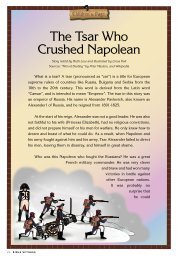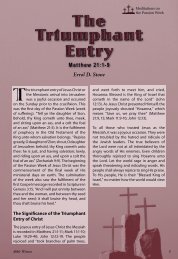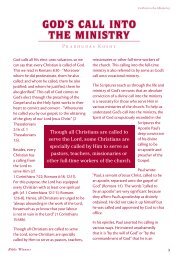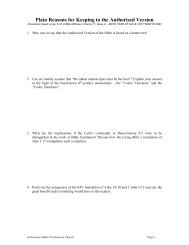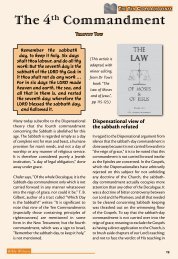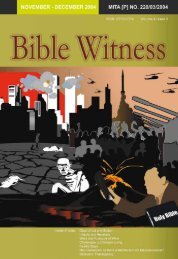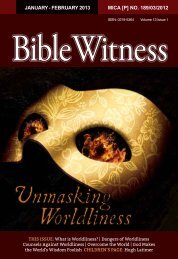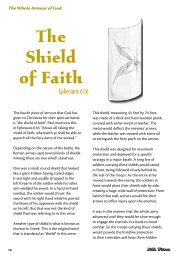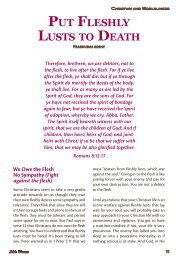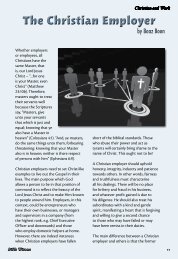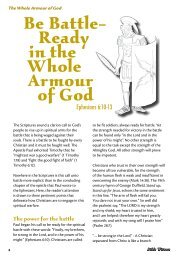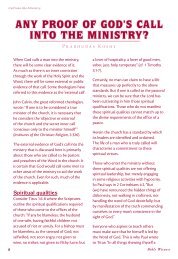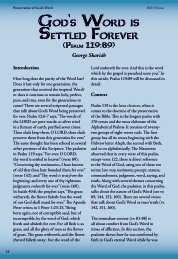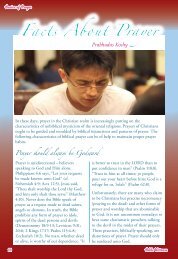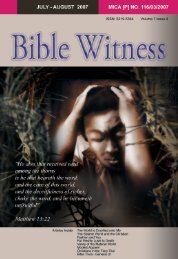Nurturing Of Children - Bible Witness
Nurturing Of Children - Bible Witness
Nurturing Of Children - Bible Witness
Create successful ePaper yourself
Turn your PDF publications into a flip-book with our unique Google optimized e-Paper software.
<strong>Bible</strong> <strong>Witness</strong><br />
contained within the world). While<br />
witches and Wiccans might practise magic<br />
or cast spells, they would more likely<br />
consider it “white magic” and not sorcery.<br />
Those who practise sorcery may adopt<br />
some pagan beliefs, but do not usually<br />
identify themselves with witchcra.<br />
Contemporary sorcery is based on a<br />
belief of accessing and manipulating<br />
energy through various methods. There<br />
are those who practise ritual magic,<br />
an involved form of sorcery based on<br />
teachings going back to ancient societies.<br />
Magic is “the art of changing<br />
consciousness and<br />
physical reality<br />
according to will,”<br />
and sorcery is “the<br />
manipulation of<br />
natural forces and<br />
powers to achieve a<br />
desired objective.”<br />
Another definition<br />
of sorcery is<br />
offered by Lewis<br />
Spence as using<br />
“supposed<br />
supernatural<br />
power by the<br />
agency of evil<br />
spirits called forth<br />
by spells by a witch<br />
or black magician.”<br />
Here is a definition by a<br />
magician: “Magic<br />
is a collection of techniques,<br />
dating back 70,000 years, aimed at<br />
manipulating the human imagination<br />
in order to produce physical,<br />
psychological, or spiritual results.”<br />
Sorcerers take their practice very<br />
seriously; it is no fantasy, but a very<br />
real part of the occult arts. Some of<br />
what is taught at Hogwarts could be<br />
part of either sorcery or contemporary<br />
witchcra, or both: studying the<br />
<strong>Nurturing</strong> of <strong>Children</strong><br />
movement of the planets, the history of<br />
magic, herbology, potions, spells, and<br />
charms. Although it is valid to clarify<br />
witchcra vs. sorcery, whether Harry<br />
Poer is called a witch, wizard, or<br />
sorcerer is irrelevant when looking at the<br />
content of these books to determine if<br />
they are appropriate for young people.<br />
Sorcery is nothing less than the aempt to<br />
replace God, since it is one’s<br />
will that is primary in<br />
practising sorcery. What<br />
must be examined are<br />
the ideas and teachings<br />
contained in the book.<br />
There are elements of<br />
fantasy and good storytelling<br />
in this book. At the<br />
same time, the whole story is set in an<br />
occult context, and with references to real<br />
occult practices and views mixed in with<br />
fantasy. The hero of the book is a wizard/<br />
witch/sorcerer whose goal is to learn how<br />
to use his powers through the occult.<br />
Much is made of the fact that the author<br />
wrote while on welfare on scraps of<br />
paper at a cafe. This makes it sound<br />
like everything is totally from her<br />
imagination; however, she did not<br />
imagine alchemy, charms, serving,<br />
Nicolas Flamel, astrology, the Dark<br />
Side, or many other occult concepts<br />
and information. It is only reasonable<br />
to assume that Rowling did some<br />
research or has had some exposure to<br />
occult and magical practices. The idea<br />
of using sorcery to fight evil, or using<br />
“good” magic to fight “bad” magic,<br />
is a major component of the plot.<br />
In 1996, a movie called “The Cra” taught<br />
the audience that using witchcra to<br />
fight evil is good. This movie helped to<br />
galvanize the growing Wicca/witchcra<br />
movement and aracted a lot of teenage<br />
21



